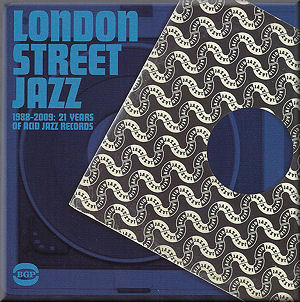1. This - The Filthy Six
2. Stoned On Denmark Street - New Jersey Kings
3. Mr Tanaka - The Brand New Heavies
4. Keep The Dream Alive - The James Taylor Quartet
5. Mr Jeckle - Max Beesley's High Vibes
6. Samba Minus One - Ed Jones Quartet
7. Bolivia - Ulf Sandberg Quartet
8. Mr P.C. - Snowboy & The Latin Section
9. Rejoice In Righteousness - The Bukkyleo Quintet
10. Eyes That Burn - Emperors New Clothes
11. Akimbo - Simon Bartholomew
12. Sweet Ohm - Ohm
13. Mercy Mercy Me - The Apostles
This is the third in a series of albums celebrating the 21st anniversary
of "acid jazz". I
have already expressed doubts about the meaning of this phrase,
and this CD compilation illustrates what a nebulous term it is. Judging
from the tracks on this album, acid jazz embraces jazz-fusion, soul
and jazz-funk as well as straightforward jazz. In most cases it is
used or devised for DJs to play for dancers in clubs.
The collection starts with This by the weirdly-named Filthy
Six. The mood of the piece is very reminiscent of Herbie Hancock's
recordings of the 1960s, like Cantaloupe Island. Trumpeter
Nick Etwell and the unnamed tenor-saxist make their marks with worthy
solos. Stoned on Denmark Street by the New Jersey Kings is
more in Shaft-style, with a juddering guitar and heavy bass.
This group was actually the James Taylor Quartet with James's brother
David as the leader.
The Brand New Heavies became famous in the 1990s with a string of
hits that included Never Stop and Dream on Dreamer.
The difficulty of categorising these groups is exemplified by the
sleeve-note saying that "The Heavies were highly influenced by
the jazz funk of the 1970s" but "to the general public they
were a pop-soul group". However, their jazz credentials are established
by the presence of such British jazz stalwarts as trumpeter Gerard
Presencer and trombonist Dennis Rollins, and they make intelligent
but danceable music.
My previous reviews of albums by the James Taylor Quartet may have
made clear that I am underwhelmed by this group, and the track included
here is typical of their dependence on simple, repetitive riffs which
(to me., at least) soon become onerous.
Mr Jeckle features a short-lived band called Max Beesley's
High Vibes, led by Max Beesley, who is now better known as an actor
than a musician. The use of the vibraphone inevitably arouses comparisons
with Roy Ayers, and this 1992 track is very much in the Ayers mould
of easy-going funk.
Saxophonist Ed Jones is well-known on the jazz scene as a leader
of his own group and as a member of Quasimodo and Killer Shrimp. His
Samba Minus One takes us away from the almost ubiquitous boogaloo
beat into straight four-four, salted with a Latin-American beat. Ed's
soprano sax soars above the rhythm, which is pushed along by bass
guitarist Rob Statham (who plays a fine solo) and drummer Winston
Clifford - another familiar face on the British jazz scene.
Ulf Sandberg is a Swedish piano teacher who became popular in the
acid-jazz world when his pupil, James Taylor, recommended him. Here
he provides another straightforward jazz composition by Cedar Walton
in common time. An anonymous tenor player contributes a good solo,
and Ulf displays his piano prowess in a long improvisation.
Perhaps it is unexpected to find John Coltrane's tune Mr P.C.
on an acid-jazz compilation but its blues base suits what Mark Colgrove
(otherwise known as Snowboy) calls his "pit-bull" Latin
jazz. This 1989 track has Latin fire but the claves-player is not
very imaginative and hinders rather than helps the beat.
Drummer Winston Clifford reappears on Bukky Leo's Rejoice in Righteousness,
which has Bukky's tenor sax competing (and sometimes clashing) with
a vocal chorus. The group called Emperors (sic) New Clothes
seems to be well named as (judging from the track on this CD) they
set up a mechanised funk beat and then tack stark (or starkers?) noises
and vocals on top of it.
Simon Bartholemew was one of the original members of the Brand New
Heavies and their style is encapsulated in his groovy Akimbo,
which highlights Simon's fuzzy guitar. Sweet Ohm is an electronic
piece by German Thomas Melchior, sounding as mechanistic as Kraftwerk.
The album ends with Marvin Gaye's Mercy Mercy Me, performed
as a feature for John Wilmott's saxophone, which is pleasant but as
middle-of-the-road as (say) Kenny G. To sum up: this is a curate's
egg of a compilation, containing some dross among the pearls and proving
how vague is the concept of "acid jazz".
Tony Augarde
